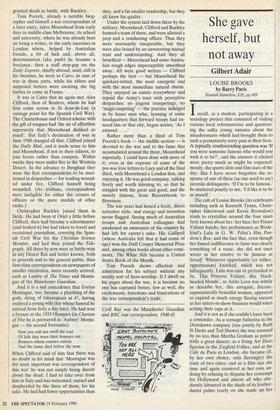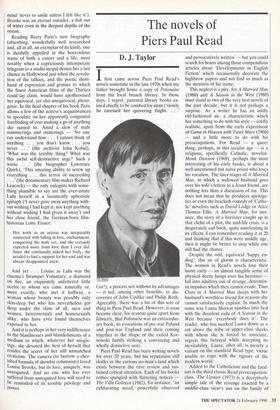She gave herself, but not away
Gilbert Adair
LOUISE BROOKS by Barry Paris Hamish Hamilton, .C20, pp.609 Irecall, as a student, participating in a sociology project that consisted of visiting various local reformatories and question- ing the sulky young inmates about the misadventures which had brought them to such a prematurely sorry pass in their lives. A typically condescending question was 'If you were someone famous who would you wish it to be?', and the answers it elicited were pretty much as might be expected: mostly, the sports idols and film stars of the day. But I have never forgotten the re- sponse of one of these (as one used to say) juvenile delinquents. 'If I'm to be famous,' he muttered poutily to me, 'I'd like it to be as myself.'
The cult of Louise Brooks (its celebrants including such as Kenneth Tynan, Christ- opher Isherwood and Kevin Brownlow) tends to crystallise around the four main facts known about her: her face; her Prince Valiant hairdo; her performance as Wede- kind's Lulu in G. W. Pabst's film Pan- dora's Box; and the fact that, even though her famed indifference to fame was clearly something of a tease, she did not once waver in her resolve to be famous as herself. Whenever opportunity (or rather, opportunism) knocked, which was not infrequently, Lulu was out or pretended to be. This Princess Valiant, this 'black- headed blonde', as Anita Loos was wittily to describe her, this arrogant, literate, supernaturally beautiful woman, appeared to expend as much energy fleeing success as her sisters-in-show-business would when setting their caps at it.
And it is not as if she couldn't have been a contender. As a teenage ballerina in the Denishawn company (run jointly by Ruth St Denis and Ted Shawn) she was assessed by no less than Martha Graham as poten- tially a great dancer; as a living Art Deco figurine in the Ziegfeld Follies, and at the Café de Paris in London, she became (if, by her own choice, only fleetingly) the toast of two cities; and as a film star she time and again connived at her own un- doing by refusing to disguise her contempt for Hollywood and almost all who obe- diently laboured in the shade of its feather- duster palms (early on she made up her
mind 'never to smile unless I felt like it'). Brooks was an eternal outsider, a fish out of water even in the deepest depths of the ocean.
Reading Barry Paris's new biography (absorbing, wonderfully well researched and, all in all, an exemplar of its kind), one is dutifully appalled at the horrendous waste of both a career and a life, most notably when a capriciously intemperate telegram to a studio mogul denies her a last chance in Hollywood just when the revolu- tion of the talkies, and the poetic short- hand of expression and gesture to which the finest American films of the Thirties could lay claim, would have apotheosised her equivocal, yet also unequivocal, photo- genie. In the final chapter of his book Paris allows a few of the actress's acquaintances. to speculate on her apparently congenital foreboding of ever making a go of anything she turned to. Amid a slew of male stammerings and stutterings — No one can understand how. . . I cannot think of anything . you don't know . . . you never . . .' (the archivist John Kobal), 'What was the terrible thing? What was this awful self-destructive urge? Such a waste , . .' (the biographer Lawrence Quirk), 'This amazing ability to screw up everything . . . this terror of succeeding . . (the documentary film-maker Richard Leacock) — the only eulogists with some- thing plausible to say are the ever-astute Lulu herself in a laconically aphoristic epitaph CI never gave away anything with- out wishing I had kept it; nor kept anything without wishing I had given it away') and her close friend, the German-born film- historian Lotte Eisner: Her work as an actress was inseparably connected with falling in love, enchantment, conquering the male sex, and she certainly expected more from love than I ever did. Since she continually risked her body, she needed to find a support for her soul and was always disappointed anew.
And yet . . . Louise as Lulu was the cinema's Strumpet Voluntary, a diamond on fire, an exquisitely unfettered little ocelot to whom sex came naturally or, more exactly, who met it halfway, a woman whose beauty was possibly only skin-deep but who has nevertheless got deep under the skins of all, men and women, heterosexuals and homosexuals alike, who have ever found themselves exposed to her.
And it is perhaps in her very indifference to the blandnesses and blandishments of a medium to which, whatever her misgiv- ings, she devoted the best of herself that resides the secret of her still unmatched eroticism. The camera (to borrow a cher- ished formula of showbiz columnists) loved Louise Brooks, but its love, uniquely, was unrequited. And no one who has ever spffered from unrequited love will need to be reminded of its terrible privilege and Power.



















































 Previous page
Previous page